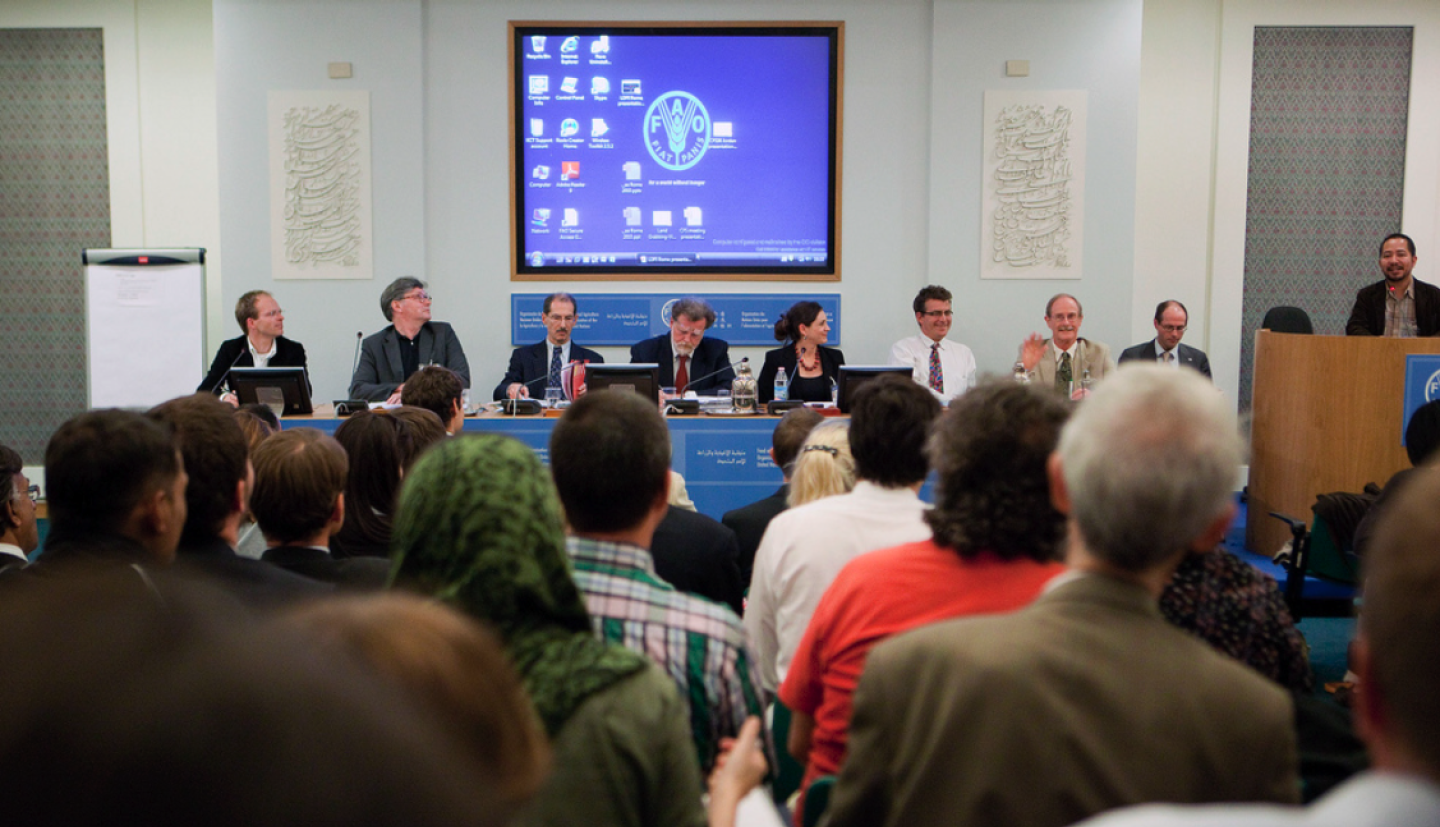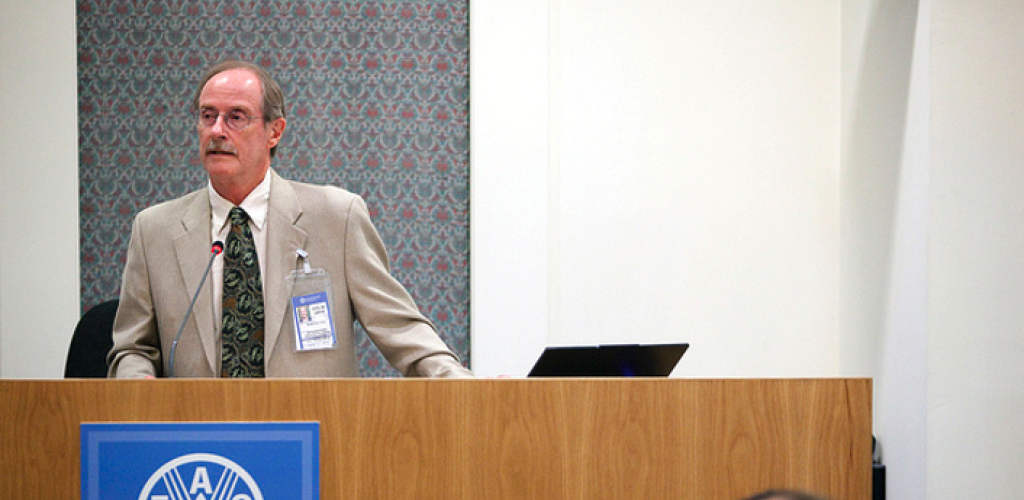For nearly 40 years, Philip McMichael has been at the forefront of development studies, ranging from white settlement in 19th century Australia, and expansion of the American cotton and slave-based plantation system, to food sovereignty movements today. McMichael, professor of global development, sees such issues as part of a broader world-historical structuring. He shares with us his own intellectual journey and recommendations for students who wish to engage in international development work.
From international food regimes to global perspectives
Following publication of my award-winning academic book, Settlers and the Agrarian Question (Cambridge U Press) I was invited to collaborate with agrarian sociologist Harriet Friedmann of the University of Toronto. In 1989 we published a paper on the “international food regime” —examining how food exporting patterns shaped the rise of the modern state system, beginning with the settler states and then Europe as world “breadbaskets” exporting staple foods, followed by multiple agro-export states today with the liberalization of the global food trade. This novel approach emphasized the role of global food provisioning in a maturing international order, organized by powerful states — proposing a global, rather than a national, unit of analysis of development (in addition to the foundational role of food).
Around 2000, I became interested in a rising international Food Sovereignty movement — comprising hundreds of millions of peasants, family farmers, fisherfolk, pastoralists, farm workers, and Indigenous peoples — to contest the destabilizing effect of trade liberalization on small producer cultures and ecosystems across the world.
As an analyst of international political economy, this broad and increasingly influential social movement was, and remains, inspiring — in championing the rights of a multiplicity of diverse farming systems and food cultures to produce local food, and to protect farmers in the global South from northern government-subsidized cheap foods dumped in their markets, as well as land enclosures as farm land has become a financial asset for foreign investors.
Outside the classroom: engaging with food issues internationally
In the aftermath of the 2008 world food crisis, in 2010 the UN Committee on World Food Security (CFS) at the Food and Agricultural Organization (FAO) in Rome incorporated a Civil Society Mechanism, representing agrarian movements and progressive NGOs. Including the CSM was a response to pressure from the International Planning Committee for Food Sovereignty — representing 1.5 billion peasant and family farming communities and Indigenous peoples — to honor its mandate for overseeing global food security by including movement representatives from the frontlines, where approximately two-thirds of the world’s food is produced.
As a consultant with the CSM I have been able to connect my research with non-academics. Working in Rome with highly motivated grassroots activists with a rural world to represent and defend in a global forum of politicians, public servants and corporate special interests gives a special meaning to my research. Social movement representatives bring a wealth of knowledge and alternative epistemologies. Grassroot social movements bring long-standing experience with struggles to recognize and preserve their life-worlds, to reclaim public support and redirect the huge subsidies currently enjoyed by big ag, and to recognize their rights. These include rights to land, to low input agroecological farming, to produce appropriate foods for territorial (rather than global) markets, as well as Indigenous, women’s, and farmworker rights.
The experience is not only a complement to academic knowledge, it also registers an ongoing claim to practice modes of food production that (with appropriate support) are so critical to the long-term health of humans, ecosystems, and the planet.

Advice for students
I have had the privilege of working with many extraordinary undergraduate and graduate students over my 32 years at Cornell. The passion of many undergraduates in my International Development course inspired me to write a textbook, Development and Social Change: A Global Perspective (Sage, 1996, published in 6 languages) – with a 7th edition forthcoming in January 2021 to address current development dilemmas. And the many graduate students with whom I have worked inspired me with their attention to far-flung field work and related issues of social justice. Thirteen of them authored chapters from their research for a volume I edited, entitled Contesting Development: Critical Struggles for Social Change (Routledge, 2010).
What I have found is that there is much opportunity for a dedicated person with the right mix of energy and drive. Here are three ways a student today can get started:
Get international development experience by working with NGOs and social justice movements
There are literally thousands of social justice movements at global, regional and local levels across the world, always looking for youthful energy and research skills. In particular, three of my former students went on to work with Why Hunger?, Food First, and Focus on the Global South. Drawing on the field experiences they had with these NGOs, they have since gone on to pursue higher degrees — for example, one is now working with the International Panel of Experts on Sustainable Food Systems (IPES-Food) and the CSM. Further, one very recent student is interning with a Seattle law firm that specializes in environmental law, and she is interested in focusing future work on ecological regulatory issues around farming, and another is at the Center on Sustainable Development at the Earth Institute, Columbia University.
Explore new research opportunities
There are so many areas in which research should be expanded, to name a few:
- Investigating the impact of COVID-19 on food systems in the future (and connecting to public health issues);
- Documenting ongoing localization initiatives of food provisioning, farmers’ markets, and farmer-to-farmer seed and knowledge sharing to make public the variety and extent of such initiatives, as alternatives to ‘food from nowhere’;
- ongoing land enclosure by investors on a global scale for speculative purposes and/or production of feed or fuel crops vs food crops, foregrounding issues of food security;
- exploring sustainable farming methods to sequester atmospheric carbon; providing research services to local, or global, food sovereignty initiatives;
- researching migrant labor circuits to document and provide assistance to farmworkers (as does Cornell’s well-known Farmworker Program); and
- of course, higher degree work to build knowledge and skill sets.
Find opportunities to develop interdisciplinary skills
Bringing together disciplines through graduate studies, ideally, can foster constructive dialogue, at this momentous time, between the social and natural sciences.
Another opportunity is to connect with progressive NGOs to work in collaborative situations on pressing issues such as environmental protection and restoration, including climate change. This includes engaging/working with rural movements and farming organizations dedicated to ‘agrarian citizenship’ (stewarding the land and producing culturally appropriate foods for local populations: fresh ‘food from somewhere’ as opposed to processed ‘food from nowhere’). One of my recent PhD student supervisees worked on, and with, inner-city black residents building a local food system on abandoned land in the city of Cleveland, reproducing foodways from their inter-generational past in the US South, while another researched farmworker working conditions in upstate NY, and yet another examined changing bee-keeping practices in an ecologically-challenged world.
There are many initiatives around re/building local agri-food systems that have exciting potential. And, of course, these issues have environmental and public health dimensions, so there is a broad array of options – not to mention possibilities of Green New Dealism across the world, and the importance of folks like us to insist on extending its principles to agrifood systems.
This piece was prepared by Brayden Preston, a student ambassador for communication in the International Agriculture and Rural Development major.
About the author
Philip is a Professor of Global Development, formerly of the Department of Development Sociology, which he chaired in 1999-2005, and in 2014-15. Philip’s research focuses on questions of development and social change, and agri-food structuring and restructuring of the modern world, from international political economy and political ecology perspectives.

Keep Exploring

News
Rohan Amin's Lurie Cup soccer tournament brings people together from Cornell and around New York state to support the pediatric hospital that saved his life.
- Global Development

News
Communities tracked by AARP's Livability Index made progress becoming more age friendly, but housing affordability and health care access remain challenges.
- Global Development

We openly share valuable knowledge.
Sign up for more insights, discoveries and solutions.


